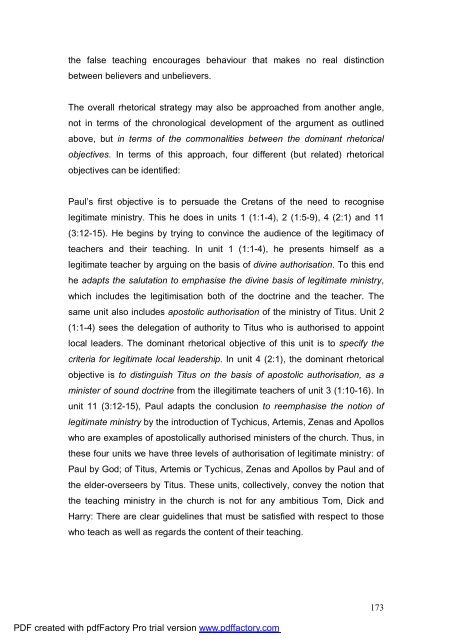A Text centred rhetorical analysis of Paul's Letter to Titus
A Text centred rhetorical analysis of Paul's Letter to Titus
A Text centred rhetorical analysis of Paul's Letter to Titus
Create successful ePaper yourself
Turn your PDF publications into a flip-book with our unique Google optimized e-Paper software.
the false teaching encourages behaviour that makes no real distinction<br />
between believers and unbelievers.<br />
The overall <strong>rhe<strong>to</strong>rical</strong> strategy may also be approached from another angle,<br />
not in terms <strong>of</strong> the chronological development <strong>of</strong> the argument as outlined<br />
above, but in terms <strong>of</strong> the commonalities between the dominant <strong>rhe<strong>to</strong>rical</strong><br />
objectives. In terms <strong>of</strong> this approach, four different (but related) <strong>rhe<strong>to</strong>rical</strong><br />
objectives can be identified:<br />
Paul’s first objective is <strong>to</strong> persuade the Cretans <strong>of</strong> the need <strong>to</strong> recognise<br />
legitimate ministry. This he does in units 1 (1:1-4), 2 (1:5-9), 4 (2:1) and 11<br />
(3:12-15). He begins by trying <strong>to</strong> convince the audience <strong>of</strong> the legitimacy <strong>of</strong><br />
teachers and their teaching. In unit 1 (1:1-4), he presents himself as a<br />
legitimate teacher by arguing on the basis <strong>of</strong> divine authorisation. To this end<br />
he adapts the salutation <strong>to</strong> emphasise the divine basis <strong>of</strong> legitimate ministry,<br />
which includes the legitimisation both <strong>of</strong> the doctrine and the teacher. The<br />
same unit also includes apos<strong>to</strong>lic authorisation <strong>of</strong> the ministry <strong>of</strong> <strong>Titus</strong>. Unit 2<br />
(1:1-4) sees the delegation <strong>of</strong> authority <strong>to</strong> <strong>Titus</strong> who is authorised <strong>to</strong> appoint<br />
local leaders. The dominant <strong>rhe<strong>to</strong>rical</strong> objective <strong>of</strong> this unit is <strong>to</strong> specify the<br />
criteria for legitimate local leadership. In unit 4 (2:1), the dominant <strong>rhe<strong>to</strong>rical</strong><br />
objective is <strong>to</strong> distinguish <strong>Titus</strong> on the basis <strong>of</strong> apos<strong>to</strong>lic authorisation, as a<br />
minister <strong>of</strong> sound doctrine from the illegitimate teachers <strong>of</strong> unit 3 (1:10-16). In<br />
unit 11 (3:12-15), Paul adapts the conclusion <strong>to</strong> reemphasise the notion <strong>of</strong><br />
legitimate ministry by the introduction <strong>of</strong> Tychicus, Artemis, Zenas and Apollos<br />
who are examples <strong>of</strong> apos<strong>to</strong>lically authorised ministers <strong>of</strong> the church. Thus, in<br />
these four units we have three levels <strong>of</strong> authorisation <strong>of</strong> legitimate ministry: <strong>of</strong><br />
Paul by God; <strong>of</strong> <strong>Titus</strong>, Artemis or Tychicus, Zenas and Apollos by Paul and <strong>of</strong><br />
the elder-overseers by <strong>Titus</strong>. These units, collectively, convey the notion that<br />
the teaching ministry in the church is not for any ambitious Tom, Dick and<br />
Harry: There are clear guidelines that must be satisfied with respect <strong>to</strong> those<br />
who teach as well as regards the content <strong>of</strong> their teaching.<br />
PDF created with pdfFac<strong>to</strong>ry Pro trial version www.pdffac<strong>to</strong>ry.com<br />
173

















